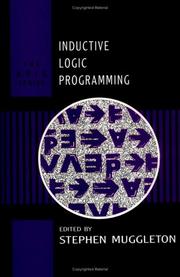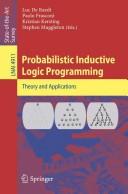| Listing 1 - 9 of 9 |
Sort by
|

ISBN: 0125097158 9780125097154 Year: 1992 Volume: 38 Publisher: London: Academic press,
Abstract | Keywords | Export | Availability | Bookmark
 Loading...
Loading...Choose an application
- Reference Manager
- EndNote
- RefWorks (Direct export to RefWorks)
Computer science --- Mathematical logic --- Logic Programming --- Machine Learning --- 681.3*F41 --- 681.3*I23 --- 681.3*I26 --- Mathematical logic: computability theory; computational logic; lambda calculus; logic programming; mechanical theorem proving; model theory; proof theory;recursive function theory--See also {681.3*F11}; {681.3*I22}; {681.3*I23} --- Deduction and theorem proving: answer/reason extraction; reasoning; resolution; metatheory; mathematical induction; logic programming (Artificial intelligence) --- Learning: analogies; concept learning; induction; knowledge acquisition; language acquisition; parameter learning (Artificial intelligence)--See also {681.3*K32} --- 681.3*I26 Learning: analogies; concept learning; induction; knowledge acquisition; language acquisition; parameter learning (Artificial intelligence)--See also {681.3*K32} --- 681.3*I23 Deduction and theorem proving: answer/reason extraction; reasoning; resolution; metatheory; mathematical induction; logic programming (Artificial intelligence) --- 681.3*F41 Mathematical logic: computability theory; computational logic; lambda calculus; logic programming; mechanical theorem proving; model theory; proof theory;recursive function theory--See also {681.3*F11}; {681.3*I22}; {681.3*I23}

ISBN: 0201175614 Year: 1990 Publisher: Wokingham : Glasgow : Addison-Wesley, Turing Institute Press,
Abstract | Keywords | Export | Availability | Bookmark
 Loading...
Loading...Choose an application
- Reference Manager
- EndNote
- RefWorks (Direct export to RefWorks)
681.3*I21 --- 681.3*I24 --- 681.3*I26 --- Applications and expert systems (Artificial intelligence). Cartography. Games. Industrial automation. Law. Medicine and science. Natural language interfaces. Office automation--See also {681.3*H4}; {681.3*J} --- Knowledge representation formalisms and methods: frames and scripts; predicate logic; relation systems; representation languages; procedural and rule-based representations; semantic networks (Artificial intelligence) --- Learning: analogies; concept learning; induction; knowledge acquisition; language acquisition; parameter learning (Artificial intelligence)--See also {681.3*K32} --- 681.3*I26 Learning: analogies; concept learning; induction; knowledge acquisition; language acquisition; parameter learning (Artificial intelligence)--See also {681.3*K32} --- 681.3*I24 Knowledge representation formalisms and methods: frames and scripts; predicate logic; relation systems; representation languages; procedural and rule-based representations; semantic networks (Artificial intelligence) --- 681.3*I21 Applications and expert systems (Artificial intelligence). Cartography. Games. Industrial automation. Law. Medicine and science. Natural language interfaces. Office automation--See also {681.3*H4}; {681.3*J}
Book
ISBN: 9780198862536 0198862539 Year: 2021 Publisher: New York: Oxford university press,
Abstract | Keywords | Export | Availability | Bookmark
 Loading...
Loading...Choose an application
- Reference Manager
- EndNote
- RefWorks (Direct export to RefWorks)
"In recent years there has been increasing excitement concerning the potential of Artificial Intelligence to transform human society. This book addresses the leading edge of research in this area. The research described aims to address present incompatibilities of Human and Machine reasoning and learning approaches. According to the influential US funding agency DARPA (originator of the Internet and Self-Driving Cars) this new area represents the Third Wave of Artificial Intelligence (3AI, 2020s-2030s), and is being actively investigated in the US, Europe and China. The chapters of this book have been authored by a mixture of UK and other international specialists. Some of the key questions addressed by the Human-Like Computing programme include how AI systems might 1) explain their decisions effectively, 2) interact with human beings in natural language, 3) learn from small numbers of examples and 4) learn with minimal supervision. Solving such fundamental problems involves new foundational research in both the Psychology of perception and interaction as well as the development of novel algorithmic approaches in Artificial Intelligence." [Publisher]
Artificial intelligence. --- Cognitive science. --- Machine learning. --- Apprentissage automatique. --- Intelligence artificielle. --- Artificial intelligence --- Cognitive science --- Artificial Intelligence --- Computational Intelligence --- AI (Artificial Intelligence) --- Computer Reasoning --- Computer Vision Systems --- Knowledge Acquisition (Computer) --- Knowledge Representation (Computer) --- Machine Intelligence --- Acquisition, Knowledge (Computer) --- Computer Vision System --- Intelligence, Artificial --- Intelligence, Computational --- Intelligence, Machine --- Knowledge Representations (Computer) --- Reasoning, Computer --- Representation, Knowledge (Computer) --- System, Computer Vision --- Systems, Computer Vision --- Vision System, Computer --- Vision Systems, Computer --- Heuristics --- Science --- Philosophy of mind --- AI (Artificial intelligence) --- Artificial thinking --- Electronic brains --- Intellectronics --- Intelligent machines --- Machine intelligence --- Thinking, Artificial --- Bionics --- Digital computer simulation --- Electronic data processing --- Logic machines --- Machine theory --- Self-organizing systems --- Simulation methods --- Fifth generation computers --- Neural computers --- Apprentissage automatique
Book
ISBN: 0191895334 0192607464 Year: 2021 Publisher: Oxford, England : Oxford University Press,
Abstract | Keywords | Export | Availability | Bookmark
 Loading...
Loading...Choose an application
- Reference Manager
- EndNote
- RefWorks (Direct export to RefWorks)
This book, authored by an array of internationally recognised researchers, is of direct relevance to all those involved in Academia and Industry wanting to obtain insights into the topics at the forefront of the revolution in Artificial Intelligence and Cognitive Science.
Artificial intelligence --- Cognitive science --- Artificial intelligence. --- Cognitive science.
Book
ISBN: 3031556305 Year: 2024 Publisher: Cham : Springer Nature Switzerland : Imprint: Springer,
Abstract | Keywords | Export | Availability | Bookmark
 Loading...
Loading...Choose an application
- Reference Manager
- EndNote
- RefWorks (Direct export to RefWorks)
This book constitutes the refereed proceedings of the 31st International Conference on Inductive Logic Programming, ILP 2022, held during September 28-30, 2022. The 11 regular papers presented in this book were carefully reviewed and selected from 26 submissions The papers in these proceedings represent the diversity and vitality in present ILP research, including statistical relational learning, transfer learning, scientific reasoning, learning temporal models, synthesis and planning, and argumentation and language. .
Artificial intelligence. --- Computer engineering. --- Computer networks. --- Compilers (Computer programs). --- Computer science. --- Machine theory. --- Artificial Intelligence. --- Computer Engineering and Networks. --- Compilers and Interpreters. --- Computer Science Logic and Foundations of Programming. --- Formal Languages and Automata Theory. --- Logic programming --- Machine learning
Digital
ISBN: 9783031556302 9783031556296 9783031556319 Year: 2024 Publisher: Cham Springer Nature, Imprint: Springer
Abstract | Keywords | Export | Availability | Bookmark
 Loading...
Loading...Choose an application
- Reference Manager
- EndNote
- RefWorks (Direct export to RefWorks)
Computer science --- Artificial intelligence. Robotics. Simulation. Graphics --- Computer. Automation --- computers --- informatica --- AI (artificiële intelligentie) --- computerkunde

ISBN: 9783540786511 3540786511 354078652X Year: 2008 Publisher: Berlin, Heidelberg : Springer Berlin Heidelberg : Imprint: Springer,
Abstract | Keywords | Export | Availability | Bookmark
 Loading...
Loading...Choose an application
- Reference Manager
- EndNote
- RefWorks (Direct export to RefWorks)
The question, how to combine probability and logic with learning, is getting an increased attention in several disciplines such as knowledge representation, reasoning about uncertainty, data mining, and machine learning simulateously. This results in the newly emerging subfield known under the names of statistical relational learning and probabilistic inductive logic programming. This book provides an introduction to the field with an emphasis on the methods based on logic programming principles. It is concerned with formalisms and systems, implementations and applications, as well as with the theory of probabilistic inductive logic programming. The 13 chapters of this state-of-the-art survey start with an introduction to probabilistic inductive logic programming; moreover the book presents a detailed overview of the most important probabilistic logic learning formalisms and systems such as relational sequence learning techniques, using kernels with logical representations, Markov logic, the PRISM system, CLP(BN), Bayesian logic programs, and the independent choice logic. The third part provides a detailed account of some show-case applications of probabilistic inductive logic programming. The final part touches upon some theoretical investigations and includes chapters on behavioural comparison of probabilistic logic programming representations and a model-theoretic expressivity analysis.
Logic programming. --- Machine learning. --- Stochastic processes. --- Programmation logique --- Apprentissage automatique --- Processus stochastiques --- Logic programming --- Machine learning --- Stochastic processes --- Computer Science --- Mechanical Engineering - General --- Engineering & Applied Sciences --- Mechanical Engineering --- Information Technology --- Artificial Intelligence --- Random processes --- Learning, Machine --- Computer science. --- Computer programming. --- Algorithms. --- Mathematical logic. --- Data mining. --- Artificial intelligence. --- Bioinformatics. --- Computer Science. --- Artificial Intelligence (incl. Robotics). --- Programming Techniques. --- Mathematical Logic and Formal Languages. --- Algorithm Analysis and Problem Complexity. --- Data Mining and Knowledge Discovery. --- Computational Biology/Bioinformatics. --- Bio-informatics --- Biological informatics --- Biology --- Information science --- Computational biology --- Systems biology --- AI (Artificial intelligence) --- Artificial thinking --- Electronic brains --- Intellectronics --- Intelligence, Artificial --- Intelligent machines --- Machine intelligence --- Thinking, Artificial --- Bionics --- Cognitive science --- Digital computer simulation --- Electronic data processing --- Logic machines --- Machine theory --- Self-organizing systems --- Simulation methods --- Fifth generation computers --- Neural computers --- Algorithmic knowledge discovery --- Factual data analysis --- KDD (Information retrieval) --- Knowledge discovery in data --- Knowledge discovery in databases --- Mining, Data --- Database searching --- Algebra of logic --- Logic, Universal --- Mathematical logic --- Symbolic and mathematical logic --- Symbolic logic --- Mathematics --- Algebra, Abstract --- Metamathematics --- Set theory --- Syllogism --- Algorism --- Algebra --- Arithmetic --- Computers --- Electronic computer programming --- Electronic digital computers --- Programming (Electronic computers) --- Coding theory --- Informatics --- Science --- Data processing --- Foundations --- Programming --- Computer software. --- Artificial Intelligence. --- Software, Computer --- Computer systems --- Artificial intelligence --- Probabilities --- Computer programming
Digital
ISBN: 9783642319518 Year: 2012 Publisher: Berlin, Heidelberg Imprint: Springer
Abstract | Keywords | Export | Availability | Bookmark
 Loading...
Loading...Choose an application
- Reference Manager
- EndNote
- RefWorks (Direct export to RefWorks)
Mathematical logic --- Logic --- Computer science --- Programming --- Artificial intelligence. Robotics. Simulation. Graphics --- informatica --- ontwerpen --- programmeren (informatica) --- wiskunde --- KI (kunstmatige intelligentie) --- robots --- AI (artificiële intelligentie)
Book
ISBN: 9783642319518 Year: 2012 Publisher: Berlin Heidelberg Springer Berlin Heidelberg Imprint Springer
Abstract | Keywords | Export | Availability | Bookmark
 Loading...
Loading...Choose an application
- Reference Manager
- EndNote
- RefWorks (Direct export to RefWorks)
This book constitutes the thoroughly refereed post-proceedings of the 21st International Conference on Inductive Logic Programming, ILP 2011, held in Windsor Great Park, UK, in July/August 2011. The 24 revised full papers were carefully reviewed and selected from 66 submissions. Also included are five extended abstracts and three invited talks. The papers represent the diversity and vitality in present ILP research including ILP theory, implementations, probabilistic ILP, biological applications, sub-group discovery, grammatical inference, relational kernels, learning of Petri nets, spatial learning, graph-based learning, and learning of action models.
Mathematical logic --- Logic --- Computer science --- Programming --- Artificial intelligence. Robotics. Simulation. Graphics --- informatica --- ontwerpen --- programmeren (informatica) --- wiskunde --- KI (kunstmatige intelligentie) --- robots
| Listing 1 - 9 of 9 |
Sort by
|

 Search
Search Feedback
Feedback About UniCat
About UniCat  Help
Help News
News